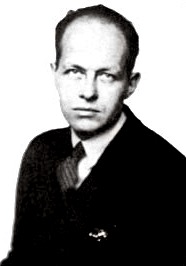Drieu la Rochelle
| Pierre Drieu La Rochelle | |
|---|---|

Pierre Drieu La Rochelle in 1938.
|
|
| Born | Pierre Eugène Drieu La Rochelle 3 January 1893 Paris, France |
| Died | 15 March 1945 (aged 52) Paris, France |
| Occupation | Novelist, short stories writer, political essays writer |
| Language | French |
| Notable works |
Nouvelle Revue Française (editor, 1940–1945) |
Pierre Eugène Drieu La Rochelle (French: [dʁjø la ʁɔʃɛl]; 3 January 1893 – 15 March 1945) was a French writer of novels, short stories and political essays. He was born, lived and died in Paris. Drieu La Rochelle became a proponent of French fascism in the 1930s, and was a well-known collaborationist during the German occupation.
Drieu was born into a middle class family from Normandy, based in the 17th arrondissement of Paris. His father was a failed businessman and womanizer who married his mother for her dowry. Although a brilliant student, Pierre failed his final exam at the École Libre des Sciences Politiques. Wounded three times, his experience as a soldier during World War I had a deep influence on him and marked him for the rest of his life.
In 1917, Drieu married Colette Jéramec, the sister of a Jewish friend. The marriage failed and they divorced in 1921. Sympathetic to Dada and to the Surrealists and the Communists, and a close friend of Louis Aragon in the 1920s, he was also interested in the royalist Action Française, but refused to adhere to any one of these political currents. He wrote "Mesure de la France" ("Measure of France") in 1922, which gave him some small notoriety, and edited several novels. He later (beginning in the 1930s) embraced fascism and anti-semitism.
...
Wikipedia
